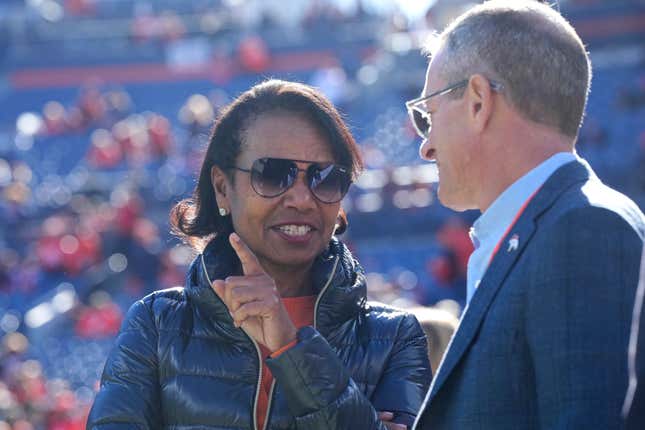
Raise your hand if you have a job. Keep it up if the person who hired you was part of a broader interview committee that included people who weren’t necessarily experts at the specific thing you were being hired to do. Good, now that everyone in the room has their hand up, let’s have a conversation about Condolezza Rice, corporate America and exactly who gets to be in which room when the jobs and paychecks are being handed out.
Fans and commentators tend to look at the NFL—and pro sports broadly—as unique entities in which the moves made by athletes on the field are only rivaled by the power moves being made by the billionaires in the owners suites. It’s not an entirely misguided perspective: The NFL is literally a playground for the elite, with entry into the club as a player or owner only available to the members of a titular class with either singular athletic gifts or plutocratic wealth. If you focus on that long enough, it’s easy to miss the ways in which the NFL parallels life on earth for those of us among the mortal ranks of fans.
That’s especially true of the league’s hiring and firing decisions on coaches and execs. Just like there’s probably a role at your gig that went to somebody well-connected and less-than-qualified, so the NFL operates as an old-boy network where people the likes of Jeff Saturday get put on by friends despite lacking experience. Plum jobs and perks get doled out to the NFL’s popular kids just like they do in your workplace. And like in your workplace, the people making those decisions are, as often as not, white men for whom the prerogative to decide who does what job, under what title and for what salary is often conveyed without regard for their expertise or experience at doing the job they’re hiring for.
Which brings us to Condolezza Rice, who is absolutely not a white male, but who, as of this moment, has the one qualification anyone needs to be part of the hiring process for an NFL head coaching job: she owns a sliver of a team that just fired a coach, specifically the Denver Broncos. The Broncos, in the midst of an abysmal season in which they’re quickly learning that Ciara’s husband is not the answer, canned their head coach this week and shortly thereafter, it was reported that Rice, the country’s first Black woman secretary of state, would have a role in picking the replacement. And that set some folks’ hair on fire.
That’s just a couple of the confused, even apoplectic tweets shared by Broncos fans in the wake of the revelation that a woman who actually owns an equity stake in the team will have a say in who runs the show on the field. Should we presume, then, that the people who have a problem with it are also totally comfortable with having no say in what happens to the major purchases they make? That they buy new cars and don’t care who drives them? That the day after closing on a new house they’ll hand the keys over to anybody who asks?
Of course they wouldn’t, and they’d also likely argue that their issue with Rice isn’t about ownership, but about knowledge—that not every minority partner in an NFL team deserves a say in who gets hired. They’d be right about that last part, but the first part—the part where Rice actually owns a piece of the $4.5 billion asset that is the Broncos, means she has a say even if she can’t distinguish a first down from a home run; the same way some guys who know nothing about cars open the hood, tinker and do more damage than good. You buy it, you have every right to break it.
The only difference between Rice and any other owner—minority partner or controlling—is the obvious one: as a Black woman, she looks nothing like the people we’re used to having a say in who calls NFL plays or makes draft picks, and nothing like the millions of no-nothings in Corporate America who are endowed with the power to make or break careers despite not knowing much of shit themselves.
The late, great Georgetown basketball coach John Thompson once said about the opportunity gap for Black folks that, “All we want is an opportunity to get out there and to try and a right to fail also. ... I’m sick of us having to be perfect to get the job.” Rice is far from perfect. There’s a lot to disagree with in her past in the Bush administration and her time as part of the college football playoff selection committee. But that, people, is what happens along the imperfect road to equal opportunity, or something like it, in America. You ain’t gotta be perfect to get a shot at succeeding or failing. And you shouldn’t have to be.

